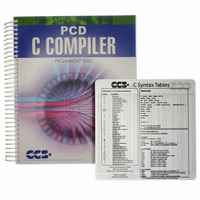PCDIDE COMPILER Custom Computer Services Inc (CCS), PCDIDE COMPILER Datasheet - Page 146

PCDIDE COMPILER
Manufacturer Part Number
PCDIDE COMPILER
Description
PCD C-COMPILER PIC24, DSPIC
Manufacturer
Custom Computer Services Inc (CCS)
Type
Compilerr
Datasheet
1.PCD_COMMAND_LINE_COMPILER.pdf
(373 pages)
Specifications of PCDIDE COMPILER
For Use With/related Products
Microchip PIC24/dsPIC®
Lead Free Status / RoHS Status
Not applicable / Not applicable
Other names
429-1008
- Current page: 146 of 373
- Download datasheet (4Mb)
#RECURSIVE
Syntax:
Elements:
Purpose:
Examples:
Example Files:
Also See:
#ROM
Syntax:
Elements:
Purpose:
132
#RECURSIVE
None
Tells the compiler that the procedure immediately following the directive will be
recursive.
#recursive
int factorial(int num) {
}
None
None
#ROM address = {list}
#ROM int8 address = {list}
#ROM char address = {list}
address is a ROM word address, list is a list of words separated by commas
Allows the insertion of data into the .HEX file. In particular, this may be used to
program the '84 data EEPROM, as shown in the following example.
Note that if the #ROM address is inside the program memory space, the directive
creates a segment for the data, resulting in an error if a #ORG is over the same
area. The #ROM data will also be counted as used program memory space.
The int8 option indicates each item is 8 bits, the default is 16 bits. The char option
treats each item as 7 bits packing 2 chars into every pcm 14-bit word.
When linking multiple compilation units be aware this directive applies to the final
object file.
Some special forms of this directive may be used for verifying program memory:
#ROM address = checksum
0x1248
This will put a value at address such that the entire program memory will sum to
if (num <= 1)
return num * factorial(num-1);
return 1;
Related parts for PCDIDE COMPILER
Image
Part Number
Description
Manufacturer
Datasheet
Request
R

Part Number:
Description:
PROTOTYPING BOARD FOR PIC MCU
Manufacturer:
Custom Computer Services Inc (CCS)

Part Number:
Description:
Extra CCS C Manual
Manufacturer:
Custom Computer Services Inc (CCS)

Part Number:
Description:
MACH X Programmer
Manufacturer:
Custom Computer Services Inc (CCS)

Part Number:
Description:
PCD For 24-bit (PIC24/dsPIC)
Manufacturer:
Custom Computer Services Inc (CCS)

Part Number:
Description:
LOAD-n-GO Programmer
Manufacturer:
Custom Computer Services Inc (CCS)

Part Number:
Description:
EMBEDDED INTERNET DEVELOPMENT KIT W/PCWH
Manufacturer:
Custom Computer Services Inc (CCS)

Part Number:
Description:
PIC24F Development Kit With PCWHD
Manufacturer:
Custom Computer Services Inc (CCS)

Part Number:
Description:
PIC24F Development Kit With PCDIDE
Manufacturer:
Custom Computer Services Inc (CCS)

Part Number:
Description:
PIC24H Development Kit With PCWHD
Manufacturer:
Custom Computer Services Inc (CCS)

Part Number:
Description:
USB Master Prototyping Board
Manufacturer:
Custom Computer Services Inc (CCS)










